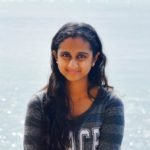In her story, Fathima describes the difficulty in navigating two different cultures as a woman, and her struggle to reconcile her cultural and religious heritage with her ambition to pursue higher educational and a professional career. Fathima is also a recipient of MALA’s Scholarship Program for 2018.
“Girls shouldn’t read so much.”
“Girls shouldn’t dress so scantily.”
“Girls shouldn’t know too much.”
This was what I heard every summer I went to India – from grandparents, from uncles, from cousins, and strangers alike.
And then I closed my eyes, and I was back in the United States; women were professors, writers, engineers. They would speak their minds and dress as they pleased and drive at night by themselves and live spontaneously.
My eyes fluttered open, and I found myself again in downtown Mumbai, near the village where I was born. Here, traditionally women were expected to bear children to be “adequate,” and make sure to suppress their dreaming so as not to offend or intimidate their supposedly superior male counterparts.
I felt like I was watching an intense match of ping-pong, transfixed, back and forth, neither side yielding. I had one foot firmly planted in red, white, and blue; the other, in a culture that valued women – but more so as mothers and housewives.
My most distant memory of this reaches back into my early childhood. The pungent aroma of mace and red pepper permeated the air, loud traditional Hindi music blared throughout the halls, and colors flashed and blurred into one another. Indian weddings are extravagant, glorified simply for being so. My young mind could do little but swim in awe of the grandeur of the event. But one thought lingered in the back of my mind – where was the bride?
She didn’t come out.
“A bride is an ornament,” I was told. She is adorned in sparkling jewelry, and showered with expensive gifts, clothed in fine silk – but her face is concealed from view. She is expected to stay hidden, as the groom greets and socializes.
I had struggled with gender roles nearly all my life. I was a free, unrestrained American girl – ‘how blessed I was’ – but I seemed to be restrained by a culture grounded thousands of miles away – an orthodox Muslim culture that traditionally required me to cover myself, be obedient, and sit down and stay quiet. Women were never asked their opinion. Questioning was viewed as defiance, and defiance was anathema.
This reality is often shocking to those in the Western world; and still shocking to me, who has grown up watching it – living it. Perhaps most significantly, my mother never went to school past the tenth grade; it simply wasn’t deemed necessary for a girl being married off at the tender age of 17 – yet it remains one of the biggest regrets of her life.
So I’d raise my hand in class more often. I’m no longer intimidated to speak up, to defy, to question. I resent the idea of being on a leash, chided for trying to explore what lay beyond the fence. I took classes deemed ‘inappropriate’ for girls in India – calculus, literature, physics, computer science.
I didn’t allow traditional values to inhibit me – I can embrace the Muslim part of my culture and still be an active member of my community, because as society advances, we take on more progressive roles. In this way, my Muslim community has brought out and polished the humanitarian and philanthropic parts of myself. I’ve taken a culture that has been demonized and minoritized and attempted to highlight the positive aspects – those that hold helping others and showing goodwill to all as central to the faith.
I retaliate with indignation, a fire to assume my own financial and intellectual independence. My opportunity to pursue higher education has implications far beyond itself inherently.
I aspire to succeed in an industry that statistically, even in the United States, remains male-dominated – computer science. Computer science represents all the innovation and analytical thought that is often forbidden to minority women, yet makes it all the more enticing for me.
Education has transformed me. It manifests itself in the way I think, the way I talk, the way I carry myself. My education has made me a walking contradiction – religious yet liberal, conservative yet open-minded. My experiences with orphans and the homeless have enlightened me and given me perspective of a world beyond my own. I have been able to reconcile the American and Muslim parts of my identity, which has not been an easy feat.
My eyes blink open again, and I find myself in an amalgamated world – one of spices and sitar music, that can serve as a background to the success I envision for myself. My identity has evolved, and despite challenges, I have been able to overcome obstacles and allow myself to define my identity as I please – as a progressive, humanitarian Muslim young woman who seeks to change the world.


